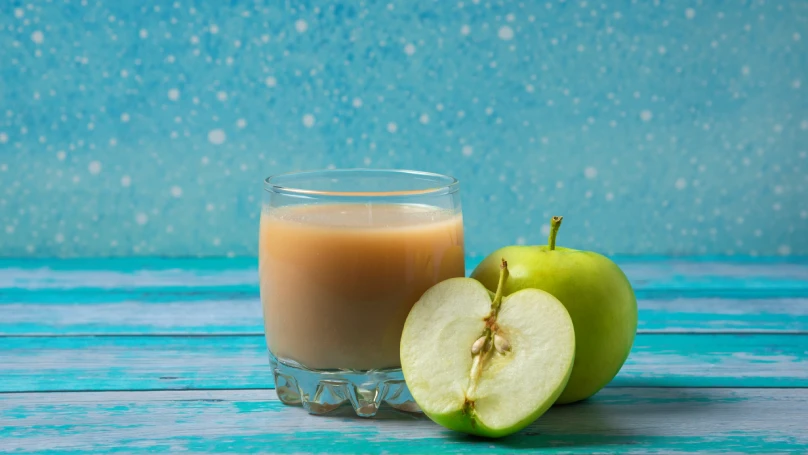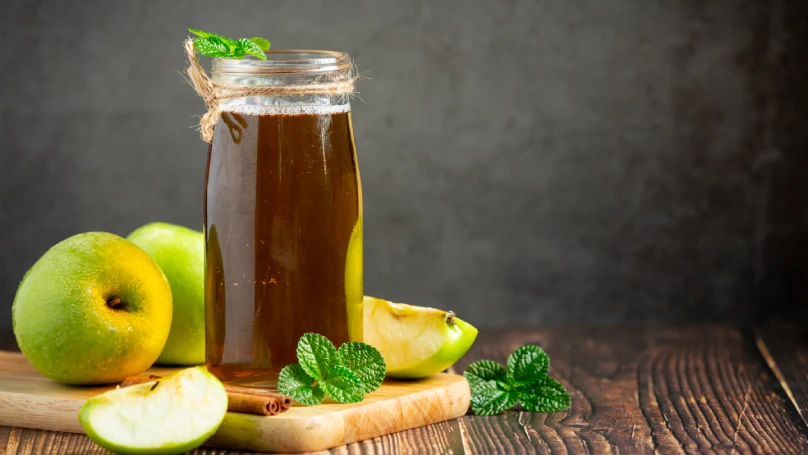Imagine diving into a freshly baked muffin, the sweetness just perfect, not too much, but just enough to satisfy that craving. Quite possibly, that delicious taste was created at the expense of apple juice concentrate. Being made from the true essence of apples, this all-natural sweetener has made its way to be involved in many recipes-from beverages to baked goods. But what apple juice concentrate is, and why has it found itself to be a pleasure among food manufacturers as well as health-conscious individuals?
Apple juice concentrate is a concentrated, syrup-like sweet liquid form obtained from the extraction of water contents in apple juice. This process intensifies the flavor of apples, increases its shelf life as well, and turns it into a convenient component for use in different food applications. Apart from that, the reason it is termed versatile is because it shows efficiency when blended with different ingredients and gives sweetness with no artificial additions.
It has some positive and negative aspects. Positively, apple juice concentrate is derived from fruits, and indeed it is made from its sugars, vitamins, and antioxidants, which play an important role in several health benefits. On the other hand, it comes with high sugar and calorie contents and an absence of dietary fiber present in whole apples. Increased adherence to sweetened consumption of beverages, especially that made from apple juice concentrate, tends to increase the risk of incurring dental cavities and contribute to obesity.
We shall elaborate on the application of concentrated apple juice as a sweetener, its health advantages, and the prospects of concerns surrounding its usage. We will also see how it is made commercially and the nutritional worth of the apple juice concentrate as compared to other sweetener products. This one-stop guide will give a brief and useful overview of concentrated apple juice in case you are a food manufacturer, concerned consumer, or just curious about what is in your favorite foods.
The Sweetening Power: How It’s Used
Apple juice concentrate is one of the most widely used ingredients in food and beverages, serving natural sweeteners and flavor enhancers. Beverages, baked goods, sauces and even savory applications all use this commonly found ingredient, which is popular among industrial food producers and home cookers alike.
- Beverages: Enhancing Flavor and Sweetness
- Fruit Juices and Nectars: The typical base used with the other fruits for making the different flavors is reconstituted apple juice with AJC.
- Soft Drinks and Flavored Waters: A natural sweetener and hints of flavor from the apple make it an attractive ingredient for juices consumed as soda or flavored water.
- Beverages with Alcohol: AJC is in the manufacturing process of cider and as a sweetening agent in some wines and cocktails.
It then becomes an alternative to artificial sweeteners almost as sweet and natural.

Health Implications: Benefits and Concerns
Apple juice concentrate is the typical natural sweetener from apple fruit, which is used for several applications in food and beverages. Though it provides some nutritional advantages, it is important to consider the health angle associated with both good and bad.
- Polyphenols, which are much known for being antioxidants, are chemical compounds found in plants AJC contains them all. It reduces the risk for chronic diseases such as heart diseases and the various types of cancers due to oxidative stress.
- Heart Health Benefit: Research points towards polyphenols found in apple juice that assist in preventing LDL (bad) cholesterol from oxidation, which is a major pathogenic factor of heart diseases.
- Hydration and Nutrient Intake: For AJC, hydration also means the provision of other nutrients such as vitamin C and potassium for overall health.
Apple juice concentrate does impart health benefits- especially so due to its antioxidant activities should be consumed cautiously. By being careful about the overall sugar content and associated health risks, anyone would make better dietary decisions. Whole fruits or diluted versions of the juice would be better alternatives than drinking AJC in huge quantities.
Regulatory Landscape: FDA Guidelines
Apple juice concentrate is extensively utilized as a natural sweetening agent in a multitude of food and beverage applications. Nevertheless, its classification and labeling must meet specifications laid down by the U.S. Food and Drug Administration (FDA). Thus, the regulations become important, especially for manufacturers and consumers alike.
The term “added sugars” as coined by the FDA pertains to sugars that are introduced during the processing of foods and includes sugars derived from syrups, honey, and concentrated fruit or vegetable juices that exceed the expected levels of that typical 100% fruit or vegetable juice. Based on this, one could conclude that when AJC sweetens products beyond its natural concentration level, it qualifies as an added sugar per the Nutrition Facts label.

Consumer Perception and Market Trends
Within the food and beverage industries, apple juice concentrate (AJC) has emerged as a prominent natural sweetening agent. This presents subtle characteristics that have actively shifted consumer preferences and market dynamics. The present section describes the consumer perception of AJC as well as the present market trends driving its growth.
An increasing number of consumers are AJC as a natural sweetener that is more healthful than refined sugar, thus reflecting the market’s general trend toward natural, clean-label ingredients. Being derived from fruits and not containing artificial additives further enhances the goodwill of AJC. Yet, growing consumer information about the high fructose content in AJC has prompted some health-conscious individuals to moderate their intake.
The Americans have been declaiming about nothing but freshly squeezed juices and whether they would sell without added sugar, as fascination with certain sugars and sweeteners-including fructose and agave syrup has spanned from 2019 to date. This evolved in the consumer mindset, however, as they learned to navigate between wanting fruits and natural syrups for healthy reasons.
Conclusion
what is apple juice concentrate (AJC) is essentially apple juice with most of its water removed, resulting in a somewhat viscous syrup. This concentration increases the taste and sweetness of the natural fructose in the apples, making AJC a widely used natural sweetener in an array of foods and beverages.
AJC does have certain health benefits such as being rich in antioxidants, in addition to essential minerals like potassium and magnesium; however, moderate amounts are recommended for consumption. The concentration increases sugar levels, specifically fructose; excessive intake can then lead to weight issues and cause rapid increases in blood sugar.
As a sweetener, AJC has been recognized and treated as “added sugar” by regulatory bodies like the U.S. Food and Drug Administration (FDA), which is now required to be indicated on the Nutrition Facts panel. The goal of this designation is to inform consumers about their sugar intake and, therefore, nurture healthful choices.
Tarazfoods is the largest apple juice concentrate supplier and exporter in iran and provides customers with a wide variety of products including fruit juice concentrates, purees, and Drinks exporter in iran. Tarazfoods is the primary choice for customers since they always maintain quality control and provide products of international standards.





